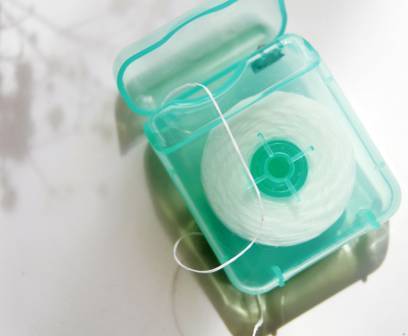Top Stories
Dental Floss: A Revolutionary Method for Vaccine Delivery?

Research published in the journal Nature Biomedical Engineering suggests that dental floss could play a pivotal role in the future of vaccine delivery. A team of scientists conducted an experiment where dental floss, coated with vaccine components like proteins or inactive viruses, was used to immunize mice against the flu. The initial findings indicate that this method may offer a novel approach to providing immunity without the need for needles.
The experiment involved carefully maneuvering the floss between the gums of mice, which are rich in absorbent tissue and immune cells. This unique location allows for a more effective response to viral threats. To carry out the procedure, researchers employed a keyring to open the mouths of the mice while another team member inserted the floss. This process took place every two weeks over a month.
After the final flossing, the vaccinated mice were exposed to a lethal strain of the flu virus. Remarkably, every mouse that received the vaccine via dental floss survived the exposure, while those that did not receive the treatment did not survive. Further analysis revealed that the vaccinated mice developed flu antibodies not only in their saliva but also in their faeces and bone marrow, indicating a strong and long-lasting immune response.
Potential Human Applications
To explore the feasibility of this method in humans, researchers conducted a small trial involving 27 healthy volunteers. Participants used dental floss picks dipped in harmless food dye, which successfully reached the gum tissue approximately 60 percent of the time. This promising result suggests that flossing could be a viable method for delivering vaccines with further refinement.
This floss-based delivery system presents several significant advantages. It is needle-free, which is beneficial for individuals who experience anxiety related to injections. Additionally, unlike many traditional vaccines that require cold storage, these vaccines could remain stable at room temperature, facilitating easier distribution. The concept of receiving vaccines through the mail, allowing individuals to “floss their way to immunity,” could revolutionize how vaccines are administered, particularly during outbreaks when rapid distribution is critical.
While these findings are encouraging, it is important to note that more research is necessary before this innovative method can replace traditional vaccination techniques. Nonetheless, the study opens up exciting possibilities for developing painless, practical, and more accessible vaccines in the future.
Dr. Michelle Dickinson, a nanotechnologist involved in the research, has highlighted the groundbreaking nature of these findings. As scientists continue to explore the potential of dental floss as a delivery system, the future of vaccination may very well be on the cusp of a significant transformation.
-

 World3 weeks ago
World3 weeks agoPrivate Funeral Held for Dean Field and His Three Children
-

 Top Stories3 weeks ago
Top Stories3 weeks agoFuneral Planned for Field Siblings After Tragic House Fire
-

 Sports3 months ago
Sports3 months agoNetball New Zealand Stands Down Dame Noeline Taurua for Series
-

 Entertainment3 months ago
Entertainment3 months agoTributes Pour In for Lachlan Rofe, Reality Star, Dead at 47
-

 Entertainment2 months ago
Entertainment2 months agoNew ‘Maverick’ Chaser Joins Beat the Chasers Season Finale
-

 Sports3 months ago
Sports3 months agoSilver Ferns Legend Laura Langman Criticizes Team’s Attitude
-

 Sports1 month ago
Sports1 month agoEli Katoa Rushed to Hospital After Sideline Incident During Match
-

 Politics2 months ago
Politics2 months agoNetball NZ Calls for Respect Amid Dame Taurua’s Standoff
-

 World4 weeks ago
World4 weeks agoInvestigation Underway in Tragic Sanson House Fire Involving Family
-

 Top Stories3 weeks ago
Top Stories3 weeks agoShock and Grief Follow Tragic Family Deaths in New Zealand
-

 Sports2 weeks ago
Sports2 weeks agoEli Katoa Shares Positive Recovery Update After Brain Surgery
-

 Entertainment6 days ago
Entertainment6 days agoJacinda Ardern Discusses Popularity Decline on Graham Norton Show





















